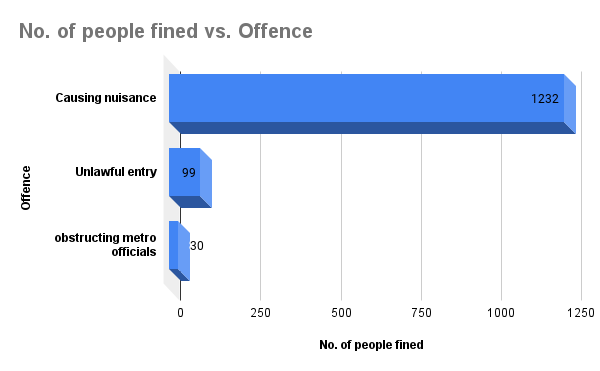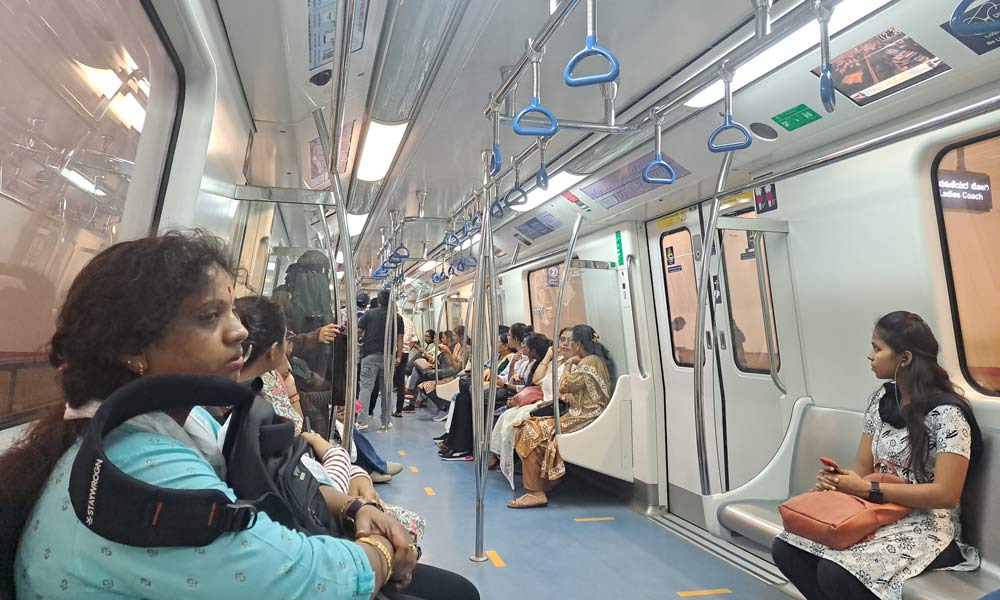Violating Bangalore Metro Rail Corporation Limited (BMRCL) rules, men often travel in coaches reserved for women, making women passengers uncomfortable, especially at night.
Women have complained of men entering through the first two doors of the locomotive which are reserved for women, defeating the purpose of the reservation.
As many as six lakh people travel in Bangalore’s Namma Metro on a daily basis and a large number of them are women. Presently, BMRCL charges Rs.500 fine for violation of rules. Boys of up to 14 years of age are allowed to travel in the women’s compartment with their guardian.
BMRCL chief Public Relations Officer (PRO), Mr. Yashavanth Chavan said “The first coach in all trains is reserved for women since 2020, when the trains were converted from three to six coaches.”
“I prefer to sit in the women’s compartment because it’s just more convenient and safer. I don’t generally see men travelling in the women’s coaches but they do sometimes, get through the doors of the reserved coach and stay in the coach until someone points it out to them,” said Pragati, a college student who travels on the Purple Line of the metro to her college and back.
Women travelling in the metro admitted that the process of registering complaints is not clear and they are not aware of the procedure. At times, the guards instruct men to not enter through the first four doors but when the guards are absent, men are generally instructed by the women travelers.
In an interview, BMRCL officials admitted that during peak hours, men enter through the first two doors reserved for women and also travel in women only compartments.
“We follow the principle of educating people first, warning them in case of first time violation of rules and then we opt for the route of levying penalty,” said the BMRCL Public Relations Officer (PRO).
Bhuvana Suresh from Association of Women Entrepreneurs of Karnataka (AWAKE) said “Women’s safety and comfort has to be addressed by metro authorities, general public also has to be conscious of their actions and abide by the rules.”
BMRCL data shows that since its start in 2011, major penalties levied for rule violations revolve around causing nuisance for which 1232 people have been fined; unlawful entry with 99 people fined and obstructing metro officials from performing duty that attracted 30 fines.

Yashavanth Chavan said, “We want Namma Metro to have an image of its own and it is only possible if people are disciplined. Initially, we followed more stringent measures and fined more people to spread awareness but now people are more aware of the rules, so we fine fewer people.”
After BMRCL’s announcement in 2019, women are allowed to carry pepper sprays with them to ensure safety.
Rakshitha Acharya, a working professional said, “I have noticed that men sometimes enter in reserved coaches when they see empty seats and if no one has an issue they do travel in the coaches but there is no way any officials would come to know if no one complains.”
A 14- year- old school girl travelling on the green line, who does not wish to be named said, “If I find any male travelling in the women’s compartment, I tell them but I don’t go and complain officially because I don’t know where to go and also I travel for my school, so I don’t want to get into any arguments.”
Mr. Yashavanth, BMRCL PRO said “We have only fined one person for travelling inside the women’s coach so far but we do encourage people to report any inconvenience people face inside the metro.”
However, a signboard reserving coaches for women inside the coaches is not possible. In an interview BMRCL officials explained that they cannot install a signboard on the coach because the train does not take a U-turn at the terminal and instead, runs in the reverse while starting from the other end.
According to BMRCL officials, there is a complaint book at every station counter and it is the primary source of registering official complaints.
Nikhil, a Christ University student and a regular metro commuter said that he himself never travels in the metro following the rules.
However, Jayant, a working professional said “I do at times, notice some men getting through the doors of the reserved coaches but in most cases they are told by women commuters to move from the reserved coaches.”
“Reserved coaches for women do help women in travelling safer but it would be effective to deploy security guards along with better use of security cameras in the unreserved coaches so women feel safer in the general compartments,” Bhuvana said.






